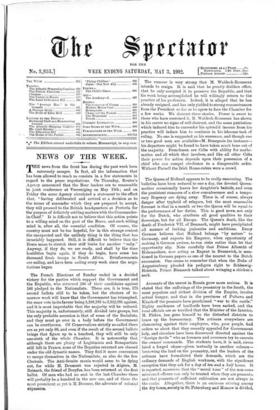The French Elections of Sunday ended in a decided victory
for the parties which support the Government and the Republic, who returned 246 of their candidates against 166 pledged to the Nationalists. There are, it is true, 175 second ballots still to be taken, but the electors of to- morrow week will know that the Government has triumphed, the mass vote in its favour being 5,198,193 to 3,352,895 against, and it is most improbable that the majority will be reduced. This majority is, unfortunately, still divided into groups, but the only probable secession is that of some of the Socialists, and they must go over in a body before the Government can be overthrown. Of Ccnservatives strictly so-called there are as yet only 66, and even if the result of the second ballots brings that figure up to a hundred, they will still be only one-sixth of the whole Chamber. It is noteworthy that although there are plenty of Legitimists and Bonapartists still left in France, none of the Deputies returned are classed under the old dynastic names. They find it more convenient to merge themselves in the Nationalists, as also do the few Clericals. The Anti-Semite mania would seem to be dying out, for while M. Drumont was rejected in Algiers, M. Reinach, the friend of Dreyfus, has been returned at the first ballot. Of men who had no seat in the last Chamber there will probably be a hundred in the new one, and of these the most prominent as yet is M. Doumer, the advocate of colonial eiPansion.










































